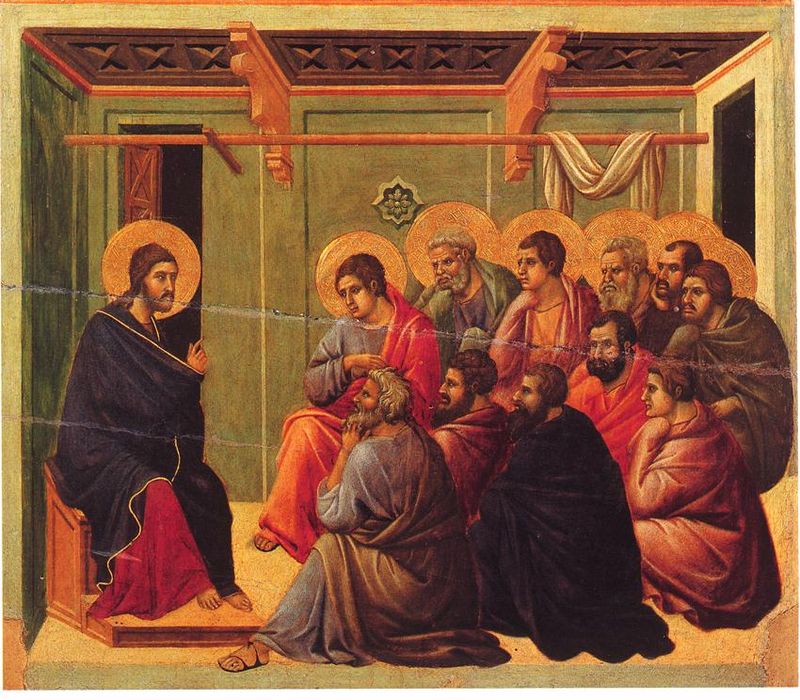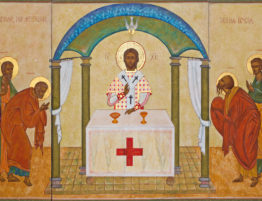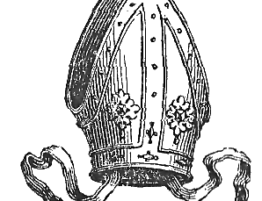
Text: Matthew 18:21-end.
As most of you know, I recently went on my first pilgrimage to Greece to follow in the footsteps of St. Paul’s early missions. In a couple of weeks, I’ll have a slideshow for you in the Sunday School hour, but for now, I’ll whet your appetite by listing a few things that we saw: St. Paul’s jail cell in Philipi, the stream where Lydia and the other women met to pray, the home of St. John and the Blessed Virgin Mary in Ephesus, St. Titus’ skull in Crete, and the Bema where Paul preached in Corinth. I highly encourage you to consider joining us on the next Greece Pilgrimage in about three years! But I’ll never forget Corinth for another reason. While we were in the museum next to the ruins, something tragic and unthinkable happened: a person with our party tripped over an unmarked change in the floor elevation, and fell right into a 3,000-year-old vase. Fortunately, the person in question was not hurt. Unfortunately, we could not say the same thing about the vase. When Fr. Chris asked our guide if the vase could be repaired, she shook her head matter-of-factly, and said, “Oh, no. It is… devastated.” When he asked about its value, there was only one word that could describe the vase: “priceless.”
Thankfully, the museum didn’t press any charges. Indeed, our guide informed us that the museum’s setup was in violation of Greek regulations for protecting antiquities as well as safety codes! But how do you bounce back from something like that? How do you handle the destruction of a priceless artifact? We did the only thing Christians can do: we came before the Lord. Indeed, less than an hour later, we had our final Holy Communion of the pilgrimage.
As we’ll see, today’s Gospel, the Parable of the Unforgiving Servant from Matthew 18, similarly speaks of prices that cannot be repaid. It speaks of a God who is much more forgiving than us. And it speaks to how Christians are to deal with forgiving each other.
But first, let’s set some context within the Gospel According to St. Matthew. Most scholars see Matthew’s Gospel as centering around five “discourses” or collections of Jesus’ teachings. Today’s Gospel is from the fourth of these discourses, the one in which Jesus focuses on the Church. Whenever you read a passage from Matthew 18-20, ask yourself how that passage answers the main question of the fourth discourse: “What is the Church supposed to be like?” What kind of community will Characterize Christians’ relationships with each other and with the world?
If you’ve got your bible or the pew bible open, just glance at the subheadings in Matthew 18. The chapter begins with the disciples arguing over who is the greatest. What’s the Lord’s answer: whoever can be humble like a little child. Jesus then goes on to discuss the dangers of temptation, and how terrible it is to lead someone else, but especially a little child, into sin. Indeed, it would be better to drown than to lead one of God’s little ones into sin. Then we have the Parable of the Lost Sheep, which is also framed with respect to God’s especial care for the little ones. Then we go into the question of what to do if your brother Christian sins against you. We talk about Church Discipline as well as Christ’s ongoing presence with his people when they gather together. And finally, we have today’s parable: the cautionary tale of an unforgiving servant. Matthew 18:21:
Peter said unto Jesus, Lord, how oft shall my brother sin against me, and I forgive him? Till seven times? Jesus saith unto him, I say not unto thee, Until seven times: but, Until seventy times seven.
It’d be easy to look at this opening exchange and see Peter once again inserting his foot into his own mouth. But when we consider that Jewish tradition of this time said that one was obliged to forgive up to three times, Peter’s initial offer of forgiving seven times does indeed seem very generous. St. Peter recognizes that the kingdom centered on the Messiah’s teaching would be even better than a kingdom that follows the Law of Moses. Yet Jesus says that forgiveness in his Kingdom would be an order of magnitude greater than Peter’s generosity. Indeed, those numbers are not random. In biblical symbolism, seven is usually a number representing perfection or completion. So, forgiveness in the Church is not just complete or perfect, but it’s perfection times completion, tenfold. That is, in the Kingdom of Heaven, we ought not keep score.
There is also a likely allusion to Genesis 4 in these numbers. You may recall that God put a curse of sevenfold vengeance on anyone who would murder Cain. Five generations later, Cain’s descendent Lamech follows in his ancestor’s wicked footsteps and calls a curse of seventy-seven-fold vengeance on anyone who would kill him. In the Greek version of the Old Testament, we have the exact same phrase as our parable: “seventy-times-seven.” In other words, Jesus is giving us a reversal of the vengeance curses in Genesis 4 when he responds to Peter’s question. The second generation of humanity begins with hatred, vengeance, and murder. This begins a pattern that just gets worse as things go on in a fallen world. But Jesus says the Church is here to reverse that pattern. We are to be a community of forgiveness, not vengeance. We are to be a community of blessings, not curses.
Jesus goes on to illustrate his answer to St. Peter by a parable. Verse 23:
Therefore is the kingdom of heaven likened unto a certain king, which would take account of his servants. And when he had begun to reckon, one was brought unto him, which owed him ten thousand talents. But forasmuch as he had not to pay, his lord commanded him to be sold, and his wife, and children, and all that he had, and payment to be made. The servant therefore fell down, and worshipped him, saying Lord, have patience with me, and I will pay thee all. Then the lord of that servant was moved with compassion, and loosed him, and forgave him the debt.
It’s important to get an idea of the kind of debt this servant owed the king. You could not go to the bank in Ancient Israel and withdraw a coin labeled a talent. Rather, in the old Testament, a talent was a unit of weight equal to about 75 pounds. In the New Testament era, it was a monetary measurement (but not an actual coin) that was worth about 6,000 drachmas, or 20 year’s wages for a laborer. So, assuming an hourly wage of $15, with 40 hours a week, and two weeks off for vacation and sickness, a single talent is about $600,000. The servant owed 10,000 talents. He owed his lord $6 billion! This would be an unimaginable monetary figure for Jesus’ audience.
Just to provide a bit of perspective, I did a quick Google query to find out what you could buy with $6 billion, and found a delightful article by NPR from 2012, titled “What Else Could $6 Billion Buy?”[1] Here’s the list (remember this is from 12 years ago, so a few things may be dated, and this has not been adjusted for inflation):
- 30 million new iPhones
- 18 million new iPads
- 3,000 NYC subway cars
- 200 F-15 Fighter Jets
- 980 public elementary schools
- 5k Lamborghini Aventadors (far more than were ever made)
- 450 small hospitals
- 545k diamond engagement rings from Tiffany’s (only 1 carat each, though)
- 1 year of lunches for 11 million public school students
- 4 Burj Khalifa skyscrapers (the tallest in the world in 2012)
Now, I don’t know about you, but that amount of money is still pretty unimaginable to this suburban preacher! The servant’s offer to pay his lord back was simply ridiculous. The king’s initial threat to sell the man and his family into slavery to offset the debt would have been a mere drop bucket against it. The debt could never be paid by any human means of restitution.
Our sin is like this. When we sin, we create a debt against God that we can never repay. It’s no different than “devastating” a 3,000-year-old vase. There is no way that we can make it right on our own. We do not have the means, we do not have the time, we do not have the know-how to fix it. The Law of Moses is no help. That traditional threefold forgiveness just won’t cut it. Even Peter’s sevenfold forgiveness won’t cut it. Indeed, we keep sinning! The debt gets bigger and bigger!
Yet, like the king in the parable, God is “moved with compassion.” By the blood of Christ, God forgives our debt. He forgives our sin. Indeed, God is more forgiving than we even expect! St. John Chrysostom writes:
Do you see again how generous he was? The servant asked only for an extension of time, but he gave him more than he asked for, remission and forgiveness of the entire debt. He wanted to give him this from the start, but he did not want the giving to be on his side only. He wanted the servant to learn from it and to ask for mercy, in order that he not be under an illusion of innocence… that he might learn from his own case and be lenient to his fellow servant, and schooled in his own calamities.[2]
Sadly, the servant does not learn the full lesson. Verse 28:
But the same servant went out, and found one of his fellow-servants, which owed him an hundred pence: and he laid hands on him, and took him by the throat, saying, pay me that thou owest. And his fellow-servant fell down at his feet, and besought him, saying, Have patience with me, and I will pay thee all. And he would not: but went and cast him into prison, till he should pay the debt.
Again, we should do some math and some monetary conversion to fully get the impact of the parable. Though the King James says, “an hundred pence,” don’t assume that the parable is talking about a dollar in total. The Greek term translated as “pence” is “denarii.” A denarius is about a day’s wage for a laborer. In other words, the second servant owed the first servant about twenty weeks’ worth of pay, about $12,000, assuming that same $15 per hour scale. This is not an insignificant amount of money. It’s not insurmountable; I daresay many of us owe more than that on our cars. But between individuals, especially working-class folk like the servants, that’s quite a sum. I certainly couldn’t lend out $12,000 willy-nilly, and would need that money if someone owed it to me!
Yet, in light of being forgiven the equivalent of $6 billion, how hard must the servant’s heart have been if he could not forgive his fellow-servant the equivalent of $12,000? Chrysostom writes this:
Do you see the mercy of the lord? Do you see the contrasted lack of mercy of the servant?… [The fellow-servant pleaded] “Have patience with me and I will pay you everything.” But [the first servant] did not even respect the very words through which he had himself been saved. With these words he himself had been freed from a debt of ten thousand talents! He did not even recognize the harbor by means of which he had escaped shipwreck. Even the gesture of supplication did not remind him of his master’s kindness.[3]
The master, of course, will not tolerate such outrageous behavior. Verse 31:
So when his fellow-servants saw what was done, they were very sorry, and came and told unto their lord all that was done. Then his lord, after that he had called him, said unto him, O thou wicked servant, I forgave the all that debt, because thou desirest me: shouldest not thou also have had compassion on thy fellow-servant, even as I had pity on thee? And his lord was wroth, and delivered him to the tormentors, till he should pay all that was due unto him. So likewise shall my heavenly Father do also unto you, if ye from your hearts forgive not every one his brother their trespasses.
Here we see that the servant’s unforgiveness not only harmed the other debtor, but it also upset the entire household. His fellow-servants “were very sorry.” The ESV renders it as “were greatly distressed.” What had started as a cause of rejoicing in their master’s goodness turned into a scandal at their fellow-servant’s wickedness.
But the Master intervenes. He rebukes the servant who would not forgive his brother, and then turns him over to be tormented in prison “till he should pay all that was due.” As Chrysostom points out, that means forever because he’ll never be able to pay the debt. Chrysostom goes on to note that though the gifts and calling of God are “irrevocable,” we can indeed reject those gifts, as this servant did. Indeed, Chrysostom says, Jesus refers to God as “my heavenly Father” rather than “your heavenly Father” in the conclusion. In his wickedness the servant had incurred God’s wrath and rejected all claims to sonship.
Now, the point is certainly that we have a duty to forgive our brother Christians because we ourselves have been forgiven an unpayable debt to God when he justifies us by our union with Christ. Remembering God’s grace, we ought to show grace. It’s important to note, however, that this parable isn’t so much as making God’s grace and forgiveness conditional to us showing grace. Rather, the justified person will show such grace. When we cannot forgive our brothers and sisters in Christ, we’re showing that we are the ones who need to repent. We are the ones acting as unbelievers rather than children of God. And that’s also why a prerequisite to coming to the Lord’s Table in Communion is “living in love and charity” with both God and your neighbor. If you’re harboring unforgiveness towards your neighbor, deal with it before coming to Communion. Don’t eat and drink condemnation upon yourself! Indeed, that’s also why in the passage immediately before our parable, we have Jesus’ instructions on how the Church is to deal with someone who is unrepentantly sinning against you.
The goal here is indeed bring everyone before the Lord in Christian love. The goal is for all of us to forgive each other as we have been forgiven. And indeed, among us sinners, it’s only those who have been forgiven that can forgive. So, embrace Christ’s forgiveness, that you can go and do the same.
In the Name of the Father, and of the Son, and of the Holy Ghost. Amen.
[1] https://www.npr.org/sections/itsallpolitics/2012/11/05/164338789/what-else-could-6-billion-buy
[2] ACCS NT 1b, 85.
[3] ACCS NT 1b, 87.







